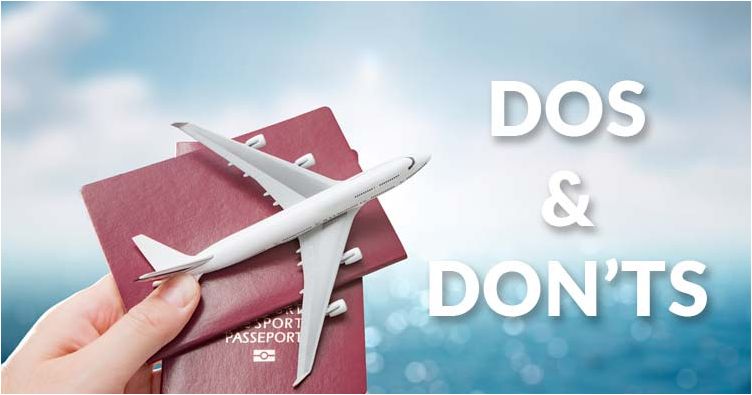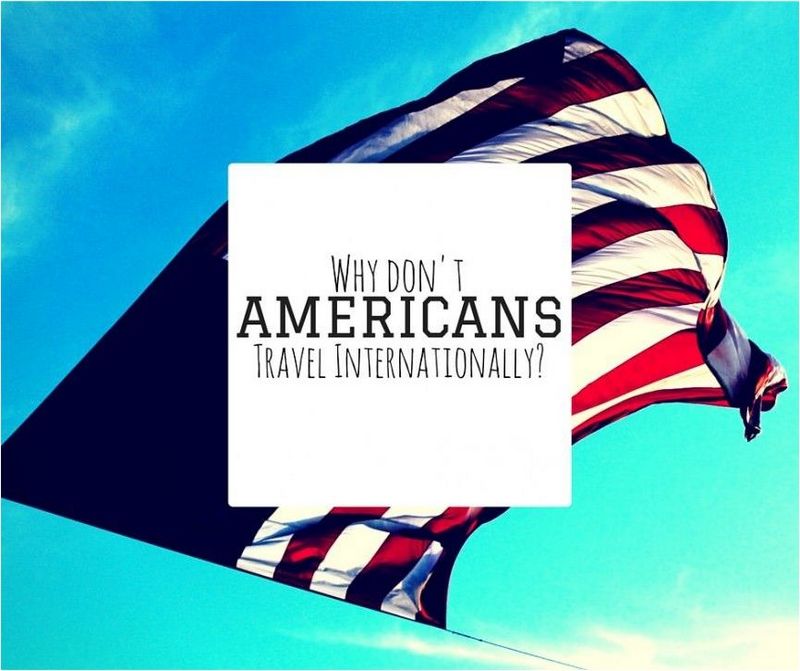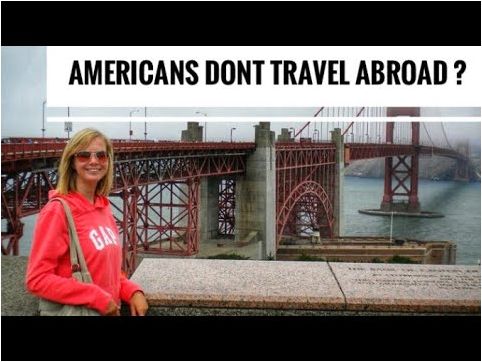
Why Americans STILL Don’t Travel Overseas
America is often called the “land of opportunity,” but when it comes to travel, many Americans still don’t venture beyond their own borders. Despite the world becoming more interconnected and accessible than ever before, there are various reasons why Americans remain hesitant to explore overseas destinations.
One of the main reasons why Americans don’t travel overseas is due to financial constraints. International travel can be expensive, especially when factoring in airfare, accommodations, and other expenses. Many Americans may simply not have the means to afford a trip abroad, especially if they have other financial obligations or limited disposable income.
Another factor that contributes to Americans not traveling overseas is a lack of time. The United States is a vast country, and many Americans prioritize exploring their own backyard before venturing abroad. With busy work schedules and limited vacation time, it can be challenging for Americans to find the time to travel internationally.
Fear is also a significant deterrent for Americans when it comes to traveling overseas. The unfamiliarity of foreign cultures and the language barrier can be intimidating for some. Safety concerns may also play a role, as Americans may perceive certain destinations as being more dangerous than others. This fear of the unknown can prevent many Americans from taking the leap and exploring new places overseas.
While there are various reasons why Americans still don’t travel overseas, it’s important to recognize that these barriers are not insurmountable. By addressing financial constraints through budgeting and saving, prioritizing travel and making it a priority, and educating oneself about different cultures and destinations, Americans can overcome their reservations and experience the joys and enriching experiences that come with international travel.
Fear of the unknown
One of the main reasons why Americans still don’t travel overseas is their fear of the unknown. The idea of venturing into unfamiliar territories, cultures, and languages can be daunting for many. The fear of not being able to communicate or navigate in a foreign country often holds people back from taking the leap to travel abroad.
Additionally, Americans may also fear encountering situations or experiences that they are unfamiliar with. This includes trying new foods, interacting with locals, or engaging in activities that they have never done before. Stepping outside of one’s comfort zone can be intimidating, especially when it comes to experiencing new cultures and customs.
Another factor that contributes to Americans’ fear of the unknown when it comes to traveling overseas is the media portrayal of other countries. News stories and movies often depict foreign countries as unsafe or dangerous, which can create a sense of fear and hesitation among potential travelers. This perception may discourage Americans from exploring new destinations and instead opt for familiar and perceived safer options within the United States.
Moreover, the fear of the unknown can also stem from a lack of information or knowledge about other countries. Americans may feel more comfortable traveling within their own country because they are familiar with the language, culture, and healthcare system. Lack of understanding about other countries’ customs, laws, and healthcare infrastructure can make Americans feel uncertain and uneasy about traveling overseas.
However, it is important to remember that embracing the unknown can lead to personal growth, cultural enrichment, and new perspectives. Overcoming the fear of the unknown can open up doors to new experiences and create lifelong memories. By educating oneself and being open-minded, Americans can overcome their fear and take the leap to travel overseas.
Language barrier
One of the main reasons why many Americans don’t travel overseas is the language barrier. While English is widely spoken and understood in many countries, it is not the primary language everywhere. Americans may feel hesitant or intimidated to travel to a country where they don’t speak the language fluently. They may worry about not being able to communicate effectively, getting lost, or not being able to navigate unfamiliar situations.
Additionally, learning a new language requires time and effort. Many Americans have busy lives and limited vacation time, making it difficult for them to dedicate the necessary time to learn a new language before traveling overseas. They may also feel overwhelmed by the prospect of learning a completely foreign language.
The language barrier can also be a source of anxiety and frustration for Americans who do travel overseas. Even with basic knowledge of a foreign language, they may struggle to understand and be understood in everyday interactions. This can make simple tasks such as ordering food, asking for directions, or shopping challenging and stressful.
Furthermore, some Americans may not see the need to learn a foreign language because they believe that English will be sufficient in most tourist areas. While this may be true to some extent, it can limit their ability to fully immerse themselves in the local culture and connect with locals on a deeper level. It can also hinder their ability to explore off-the-beaten-path destinations and have more authentic experiences.
Despite the language barrier, there are resources and strategies available for Americans to overcome this challenge. They can learn basic phrases and vocabulary before their trip, carry a translation app or dictionary, or even take language classes. By making an effort to learn and communicate in the local language, Americans can enhance their travel experience and open themselves up to new cultural experiences.
Perception of higher costs
One of the reasons why Americans still don’t travel overseas is the perception of higher costs. Many Americans believe that traveling abroad is expensive and that they cannot afford it. This perception is reinforced by various factors, including the high cost of international flights, accommodation, and transportation.
However, this perception is not always accurate. While it is true that some popular destinations can be expensive, there are also many affordable options available. For example, travelers can choose destinations that have a lower cost of living or take advantage of travel deals and discounts.
Another factor contributing to the perception of higher costs is the misconception that everything will be more expensive overseas. In reality, the cost of living can vary greatly from country to country. While some expenses may be higher in certain destinations, such as tourist areas or major cities, other costs, like food and transportation, can be surprisingly affordable.
Furthermore, it’s important to consider the value and experience gained from traveling overseas. While it may require some financial planning and budgeting, the cultural immersion, personal growth, and unique experiences that come with traveling abroad can far outweigh the perceived higher costs.
It is worth noting that the perception of higher costs can also be influenced by other factors, such as economic conditions, personal financial situations, and cultural attitudes towards travel. However, by addressing these perceptions and providing accurate information about the affordability and benefits of overseas travel, more Americans may be encouraged to explore the world beyond their borders.
Lack of vacation time
A major reason why Americans still don’t travel overseas is the lack of vacation time. Unlike many other countries, where employees are legally entitled to a certain number of paid vacation days each year, the United States does not have a federal law guaranteeing paid time off. This means that many Americans have limited vacation days or may not even have any paid time off at all.
Without sufficient vacation time, it becomes challenging for Americans to plan and take extended trips abroad. The limited number of vacation days makes it difficult for individuals to allocate enough time for overseas travel, often opting for shorter domestic trips instead.
Furthermore, there is often a cultural expectation in the United States that employees should prioritize work over personal time. This work-centric mindset leads to Americans being hesitant to take time off, afraid that it may negatively impact their careers or their standing within their companies.
In addition to the lack of vacation time, the cost of international travel can also be a barrier for many Americans. Overseas trips often require significant financial investment, including airfare, accommodation, and other expenses. For individuals with limited vacation time, it may not be financially feasible to spend a large portion of their vacation budget on a single international trip.
In conclusion, the lack of vacation time plays a significant role in why many Americans still don’t travel overseas. Limited vacation days and the cultural expectation to prioritize work make it challenging for individuals to plan and take extended trips abroad. Moreover, the costs associated with international travel can also deter Americans from venturing overseas. Addressing these factors and promoting a healthier work-life balance could contribute to more Americans experiencing travel beyond their home country.
Cultural differences
One of the reasons why many Americans don’t travel overseas is because of cultural differences. Americans are often more comfortable and familiar with their own culture, customs, and traditions. They may feel apprehensive or unsure about immersing themselves in a completely different culture.
Additionally, language barriers can be a significant factor. Many Americans only speak English and may worry about communication difficulties in a foreign country where English is not widely spoken. This can make them hesitant to travel, as they may fear getting lost or not being able to navigate their way around.
Furthermore, Americans may have preconceived notions or stereotypes about other cultures that can deter them from traveling overseas. These stereotypes can range from perceptions of safety and cleanliness to ideas about food and lifestyle. Such stereotypes can create a sense of fear or discomfort, making Americans hesitant to explore other countries.
Moreover, the cost of international travel can also be a barrier for many Americans. Traveling overseas can be expensive, and not everyone has the financial means to afford it. This financial constraint can prevent Americans from experiencing different cultures and destinations around the world.
Lastly, the fear of the unknown can play a significant role in why Americans still don’t travel overseas. Venturing into unfamiliar territory can be intimidating, and some individuals may prefer to stay within their comfort zone. The fear of the unknown, coupled with other factors mentioned, can greatly impact the decision to travel abroad.
Preference for domestic travel
Americans have a strong preference for domestic travel, which is one of the main reasons why they still don’t travel overseas as much as people from other countries. The United States is a vast and diverse country, offering a wide range of landscapes, climates, and attractions that can satisfy almost any traveler’s interests. From the stunning beaches of California and Hawaii to the iconic landmarks of New York City and the natural wonders of the national parks, there is no shortage of options for those who prefer to explore their own backyard. Domestic travel also offers the advantage of familiarity, as Americans are already accustomed to the language, culture, and customs of their own country.
Furthermore, domestic travel can be more convenient and affordable for Americans. Traveling within the country eliminates the need for passports, visas, and international flights, which can be time-consuming and expensive to obtain. It also reduces the hassle of dealing with currency exchange rates and unfamiliar transportation systems. Many Americans may also prefer to support the local economy by spending their travel budget within the country rather than abroad.
Another factor contributing to the preference for domestic travel is the perception of safety. Although travel risks exist everywhere, Americans may feel more comfortable traveling within their own country, where they are familiar with the healthcare system, legal rights, and emergency services. The media coverage of international conflicts and incidents may also influence the perception of safety and discourage Americans from venturing overseas.
Despite these reasons, it is important to note that there is a growing number of Americans who are beginning to embrace international travel. The rise of budget airlines, the convenience of online booking platforms, and the increasing availability of travel information and resources have made international travel more accessible and appealing to many Americans. As the world becomes more interconnected and globalized, it is likely that the preference for domestic travel among Americans will continue to shift and evolve.

In conclusion, Americans still don’t travel overseas as much as people from other countries due to their preference for domestic travel. The vastness and diversity of the United States, the convenience and affordability of traveling within the country, and the perception of safety all contribute to this preference. However, with the changing landscape of travel and increasing opportunities for international exploration, the travel habits of Americans may gradually change in the future.
Lack of interest in other countries
Americans have numerous reasons for why they don’t travel overseas, and one of the main factors is a lack of interest in exploring other countries. With the vast size and diversity of the United States, many Americans feel that they can fulfill their travel desires within their own borders. The country offers a wide range of landscapes, climates, and cultures, making it a compelling destination for many.
Additionally, some Americans may not feel a strong desire to travel abroad because they are unfamiliar with other countries and their cultures. The United States is often referred to as a “melting pot” due to its diverse population, but this can also lead to a sense of cultural comfort and familiarity. As such, some Americans may be apprehensive about venturing outside their comfort zone and experiencing new cultures and customs.
Another factor contributing to the lack of interest in other countries among Americans is the perception that international travel is expensive and time-consuming. Many Americans have limited vacation time and tight budgets, making it difficult to justify spending both time and money on overseas travel. Domestic travel may be seen as a more affordable and convenient option for those looking to explore new destinations.
Furthermore, the language barrier can also deter Americans from traveling overseas. English is widely spoken and understood in the United States, so the prospect of navigating a foreign country where English may not be the primary language can be intimidating. This can create hesitancy and discourage Americans from venturing outside their comfort zone.
In conclusion, the lack of interest in other countries among Americans can be attributed to a variety of factors including the size and diversity of the United States, cultural familiarity, cost and convenience considerations, and the language barrier. However, it is important to note that not all Americans share this lack of interest, and there are many who actively seek out opportunities to travel and explore other countries.
Safety concerns
One of the main reasons why Americans still don’t travel overseas is due to safety concerns. With the uncertainties and dangers in some parts of the world, many Americans choose to stay within the borders of their own country. They fear the potential risks that come with international travel, including terrorist attacks, political unrest, and natural disasters.
While no destination is completely risk-free, some countries are perceived to be more dangerous than others. Americans may feel safer within the familiar surroundings of the United States, where they have a better understanding of the local laws, healthcare system, and emergency services. The fear of the unknown in foreign countries can prevent them from venturing out and experiencing other cultures.
Safety concerns are also fueled by media coverage of travel incidents and emergencies. Negative news stories about accidents, crime, or violence in popular tourist destinations can create a sense of fear and make Americans hesitant to travel overseas. The constant stream of information about global threats can reinforce the idea that staying at home is the safest option.
Another factor contributing to safety concerns is the language barrier. Americans who don’t speak the local language may worry about their ability to communicate effectively in case of an emergency or even just for basic needs. This fear of being unable to navigate unfamiliar surroundings and communicate with locals can discourage them from embarking on an overseas trip.
Despite the safety concerns, it is important to note that many Americans do recognize the value of travel and are willing to take precautions to ensure their safety. This can include researching destinations beforehand, purchasing travel insurance, and staying informed about current events. However, for some, the perceived risks and uncertainties outweigh the benefits of international travel, leading them to choose to stay within the safety of their own country.
Limited exposure to other cultures
A major reason why many Americans don’t travel overseas is their limited exposure to other cultures. The United States is a vast and diverse country, with a wide range of landscapes, climates, and cultural traditions. This can lead to a sense of comfort and familiarity, making it less necessary for Americans to seek out new experiences in foreign countries.
Additionally, the size and population of the United States often results in Americans having less exposure to other languages and cultures on a day-to-day basis. Unlike many European countries, where different languages and cultures are in close proximity, Americans may go their entire lives without interacting with people from different backgrounds. This lack of exposure can make the idea of traveling overseas seem daunting or less appealing.
Furthermore, there is often a focus on domestic travel within the United States, with many Americans opting to explore their own country rather than venturing abroad. The country is home to an array of stunning natural wonders, bustling cities, and vibrant cultural centers, making it an attractive destination in its own right. This focus on domestic travel can overshadow the desire to explore other countries and cultures.
Additionally, the cost and logistics of traveling overseas can be significant barriers for many Americans. International flights can be expensive, and planning a trip overseas requires time, research, and possibly obtaining a passport and visas. This can deter individuals from pursuing overseas travel, especially if they perceive it as being more challenging or inconvenient than exploring within the United States.
In conclusion, limited exposure to other cultures, a focus on domestic travel, and the cost and logistics of traveling overseas are some of the reasons why many Americans don’t travel abroad. Despite the advantages and opportunities that come with exploring other countries, the unique characteristics of the United States and its vast offerings can often make overseas travel seem less necessary or accessible.
Difficulty in obtaining travel visas
One of the main reasons why Americans still don’t travel overseas is the difficulty in obtaining travel visas. Many countries require Americans to obtain a visa before they can enter. This involves going through a lengthy application process, providing various documents and paying fees.
The process of obtaining a travel visa can be time-consuming and complicated. Americans need to gather all the necessary documents, such as a valid passport, bank statements, proof of accommodation, and travel insurance. They also need to fill out application forms and provide biometric data, such as fingerprints. This can be daunting and discouraging for many Americans, especially those who are not familiar with the process or do not have the time to navigate through it.
In addition, some countries have strict visa requirements, making it even more difficult for Americans to travel. Certain countries may require Americans to have a sponsor or provide a detailed itinerary of their trip. Others may have specific restrictions on who can apply for a visa, such as age or nationality limitations.
The complexity and cost of obtaining a travel visa can be a barrier for many Americans who are interested in traveling overseas. It can deter them from pursuing their travel plans or make them choose destinations that do not require a visa. This is one of the reasons why Americans still hesitate to travel abroad and prefer to explore domestic destinations instead.
Lack of awareness about overseas destinations
A significant reason why many Americans don’t travel overseas is their lack of awareness about the many amazing destinations around the world. While there is a multitude of countries and cultures waiting to be explored, many Americans simply aren’t familiar with the incredible experiences that can be had outside of their own borders.
One of the main factors contributing to this lack of awareness is the limited exposure that Americans have to foreign destinations in their day-to-day lives. The vastness of the United States and its diverse landscape allows for a wide range of domestic travel options, making it easy for Americans to overlook the possibilities of international travel.
Additionally, the American education system often prioritizes the study of domestic history and culture, leaving little room for the exploration of other countries. This lack of emphasis on international education further perpetuates the lack of awareness about overseas destinations.
- Inadequate media coverage
- Language barrier
- Cultural differences and stereotypes
Another factor is the inadequate media coverage of overseas destinations in the American media. Television shows, movies, and travel documentaries primarily showcase domestic travel destinations, reinforcing the idea that there is no need to travel overseas.
The language barrier is also a significant challenge for many Americans. English is spoken widely around the world, but the fear of not being able to communicate effectively in a foreign country can deter potential travelers. This lack of language skills can create a sense of discomfort and uncertainty which can prevent Americans from venturing overseas.
Cultural differences and stereotypes can also play a role in Americans choosing not to travel overseas. Fear of the unknown and misconceptions about foreign cultures can make Americans hesitant to explore destinations outside of their comfort zone.
In conclusion, the lack of awareness about overseas destinations is a key reason why many Americans don’t travel internationally. Limited exposure, inadequate education, inadequate media coverage, language barriers, and cultural differences all contribute to this lack of awareness. In order to promote international travel, it is important to increase awareness and education about the incredible opportunities that await Americans abroad.
Prioritization of other expenses
One of the main reasons why Americans don’t travel overseas is the prioritization of other expenses. Traveling abroad can be expensive, and many Americans choose to allocate their resources to other financial obligations and experiences closer to home.
For some, the cost of international travel is simply too high. There are expenses such as flights, accommodation, transportation, and meals that can quickly add up. Americans may prioritize paying bills, saving for retirement, or investing in their education or career over traveling overseas.
Additionally, there are other experiences and activities that Americans may prioritize over international travel. They may choose to explore their own country first, focusing on domestic travel destinations such as national parks, beaches, and cultural landmarks. This allows them to experience diverse landscapes and cultures within their own borders without the additional cost and logistical challenges of traveling abroad.
Furthermore, Americans may have financial responsibilities or commitments that make it difficult to travel overseas. They may have mortgages, car payments, or student loans that restrict their ability to allocate funds for international travel. Additionally, the high cost of living in some parts of the country may leave little room in the budget for discretionary spending on travel.
In conclusion, the prioritization of other expenses is a significant factor in why many Americans don’t travel overseas. Whether it’s the high cost of international travel, prioritizing other financial obligations, or focusing on domestic exploration, Americans may choose to allocate their resources and experiences closer to home.
Health concerns
One of the main reasons why Americans still don’t travel overseas is due to health concerns. With the increasing prevalence of infectious diseases and pandemics, such as the recent COVID-19 outbreak, many individuals are hesitant to travel to foreign countries where the health risks may be higher. The unknown nature of healthcare systems, access to medical facilities, and the possibility of contracting diseases abroad make Americans more comfortable staying within the safety and familiarity of their own country.

The difference in healthcare standards and practices between the United States and other countries also plays a significant role in Americans’ reluctance to travel overseas. The high quality and advanced medical technology available in the US may not be readily available or up to par in other countries. This raises concerns about the level of care Americans would receive if they were to fall ill or have a medical emergency while traveling abroad.
In addition to physical health concerns, mental health is also a factor that discourages Americans from traveling overseas. The stress and anxiety associated with traveling to unfamiliar places, navigating different cultures, and being away from the comfort of home can be overwhelming for some individuals. Concerns about being able to find appropriate accommodations, communicate effectively, and handle unexpected situations can deter Americans from embarking on overseas travel adventures.
Furthermore, the cost of healthcare and potential travel insurance can be a barrier for Americans considering overseas travel. Medical expenses in foreign countries can be significantly higher than what individuals are accustomed to in the US, and travel insurance policies may not always adequately cover these costs. This financial uncertainty creates another layer of concern for individuals who are already hesitant to travel overseas.
Ultimately, while there are numerous reasons why Americans still don’t travel overseas, health concerns play a significant role in their decision-making process. The fear of contracting diseases, lack of trust in foreign healthcare systems, mental health considerations, and financial implications all contribute to Americans prioritizing domestic travel over international adventures.
Travel restrictions
Many Americans still don’t travel overseas for various reasons, and one of them is travel restrictions. These restrictions can be imposed by governments in response to security concerns, health and safety risks, or political tensions between countries.
One of the main reasons why Americans don’t travel overseas is the fear of terrorism. The rise of terrorist attacks in recent years has led to increased security measures and travel advisories, discouraging people from visiting certain countries or regions. This fear of potential danger and the uncertainty surrounding travel abroad have made some Americans reluctant to venture beyond their borders.
Health and safety concerns also play a role in Americans’ decision not to travel overseas. Outbreaks of diseases or natural disasters can create a sense of unease and prevent people from taking trips abroad. The COVID-19 pandemic, for example, has led to widespread travel restrictions and a significant decrease in international travel.
Political tensions between countries can also impact Americans’ willingness to travel overseas. Diplomatic conflicts or strained international relations can result in travel advisories or visa restrictions, making it difficult or even impossible for Americans to visit certain countries. This limitation on travel options can discourage people from planning trips abroad.
In addition to these restrictions, many Americans simply don’t have the desire or financial means to travel overseas. Domestic travel within the United States offers a wide range of destinations and experiences, making it an attractive option for those who prefer to explore their own country. Language barriers, cultural differences, and the unfamiliarity of foreign destinations can also be deterrents for some.
Overall, travel restrictions, whether imposed for security, health, or political reasons, contribute to the reasons why many Americans still don’t travel overseas. The combination of fear, uncertainty, and limited access to certain destinations makes some prefer to stay within their comfort zones and explore what their own country has to offer.
Unfamiliarity with international travel logistics
Americans are known for their love of travel, but many still choose not to venture overseas. One reason for this is their unfamiliarity with the logistics of international travel. Unlike domestic travel, which is often straightforward and familiar, traveling to a foreign country involves a whole new set of rules and considerations.
One of the main challenges that Americans face when traveling overseas is navigating the complexities of different transportation systems. From figuring out the local public transportation options to understanding the driving rules and regulations, it can be overwhelming for Americans who are used to the convenience of their own cars or familiar public transportation in their home country.
Another aspect of international travel logistics that Americans may find daunting is dealing with foreign currencies and exchange rates. While credit cards are widely accepted in many parts of the world, there are still instances where cash is necessary. Understanding how much things cost in a different currency and calculating exchange rates can be confusing, especially for those who are not used to dealing with foreign currencies on a regular basis.
Language barriers also play a role in Americans’ unfamiliarity with international travel logistics. While English is spoken in many parts of the world, there are still many countries where it is not the primary language. Communicating with locals, reading signs and menus, and asking for directions can be challenging when there is a language barrier. This can make Americans hesitant to travel overseas, as they may worry about getting lost or not being able to effectively communicate their needs.
Overall, the unfamiliarity with international travel logistics is one of the reasons why many Americans still choose not to travel overseas. The complexities of different transportation systems, dealing with foreign currencies, and language barriers can be overwhelming and intimidating. However, with proper planning, research, and guidance, Americans can overcome these challenges and have incredible experiences exploring the world beyond their borders.
Preference for familiar surroundings
One of the reasons why Americans still don’t travel overseas as much as other nationalities is their preference for familiar surroundings. Many Americans feel more comfortable and at ease in their own familiar environment, rather than stepping outside of their comfort zone and exploring new and unfamiliar places. This preference for the known and predictable can be seen in various aspects of American culture, from their food choices to their leisure activities.
Another factor that contributes to this preference is the sheer size and diversity of the United States. With a landmass that spans across continents and encompasses various climates, landscapes, and cultures, Americans can experience a wide range of experiences without leaving their own country. From the beaches of California to the mountains of Colorado, Americans have a diverse array of options to explore within their own borders.
In addition to their preference for familiar surroundings, Americans also often have limited vacation time compared to Europeans and Australians, which can make international travel more challenging. Many Americans only have a few weeks of vacation per year, leaving them with limited time to plan, organize, and execute a trip overseas. This limited time frame often leads to Americans prioritizing domestic travel or shorter trips that can be taken closer to home.
Furthermore, the perceived cost and logistics of international travel can also deter some Americans from venturing overseas. The idea of language barriers, unfamiliar customs, and potential safety concerns can be daunting for those who have never ventured outside of their home country. Additionally, the cost of flights, accommodation, and other travel expenses can often be higher for international trips compared to domestic travel, making it less accessible for some Americans.
Perception of inconvenience or hassle
Americans often cite the perception of inconvenience or hassle as a major reason why they still don’t travel overseas. The idea of going through the process of obtaining a passport, applying for visas, and dealing with customs and immigration procedures can be off-putting for many. The perceived complexity and time-consuming nature of these bureaucratic processes can discourage Americans from pursuing international travel.
Additionally, the language barrier can be seen as a potential inconvenience. Many Americans are only fluent in English and may be hesitant to travel to countries where English is not widely spoken. The fear of not being able to communicate effectively can make travel seem daunting and uncomfortable.
Furthermore, the perception of safety and security concerns can also discourage Americans from traveling abroad. Media coverage of political instability, terrorism, and crime in certain countries can create a sense of fear and uncertainty. The thought of encountering unfamiliar situations or potentially dangerous environments can be enough to deter Americans from venturing beyond their own borders.
Another factor contributing to the perception of inconvenience or hassle is the cost of international travel. Americans may believe that traveling overseas is prohibitively expensive, with the costs of flights, accommodation, and activities adding up quickly. The perception that international travel is a luxury only accessible to the wealthy can make it seem like an unrealistic or impractical option for many Americans.
Overall, the perception of inconvenience or hassle plays a significant role in why Americans still don’t travel overseas. The bureaucratic processes, language barriers, safety concerns, and perceived costs can all contribute to the hesitation and reluctance to explore the world beyond their own borders. However, with proper planning, research, and an open mindset, these perceived barriers can be overcome, allowing Americans to experience the enriching and transformative power of international travel.
FAQ:
Why do Americans prefer to travel domestically rather than overseas?
There are several reasons why Americans prefer to travel domestically rather than overseas. One reason is that domestic travel is generally more convenient and less expensive, as there are no language barriers, visa requirements, or long flights to deal with. Additionally, Americans may feel more comfortable and familiar with their own country, and may have more knowledge about the destinations and attractions within the United States. Cultural differences and a fear of the unknown could also play a role in Americans choosing to stay within their own borders.
What are some of the barriers preventing Americans from traveling overseas?
There are a few barriers that may prevent Americans from traveling overseas. One is the cost associated with international travel, including expensive flights, accommodations, and activities. Another barrier could be a lack of vacation time, as Americans generally have less time off compared to other countries. Language barriers and a fear of the unknown can also be factors, as Americans may feel uncomfortable navigating foreign countries where they don’t speak the language or understand the customs.
Are there any misconceptions or stereotypes that Americans have about traveling overseas?
Yes, there are some misconceptions and stereotypes that Americans have about traveling overseas. One is the belief that traveling overseas is always dangerous or unsafe, when in reality, many popular destinations are quite safe for tourists. Another misconception is that travel outside of the United States is always expensive, when in fact, there are many budget-friendly options available. Some Americans may also have stereotypes about the cleanliness, infrastructure, or quality of services in other countries, which may deter them from traveling overseas.
What are some benefits of traveling overseas?
There are numerous benefits to traveling overseas. One major benefit is the opportunity to experience different cultures, languages, and customs first-hand. This can broaden a person’s understanding of the world and increase their appreciation for diversity. Traveling overseas also provides the chance to see iconic landmarks and historical sites, try new and delicious foods, and engage in unique experiences that may not be available domestically. Additionally, travel can promote personal growth, independence, and a sense of adventure.
How can Americans overcome their reluctance to travel overseas?
There are a few ways that Americans can overcome their reluctance to travel overseas. One is by doing research and becoming more knowledgeable about their desired destinations. This can help eliminate fears or misconceptions about foreign countries. Additionally, taking small steps towards overseas travel, such as visiting nearby international destinations or taking guided tours, can help build confidence and familiarity with the process. Seeking out recommendations and advice from others who have traveled overseas can also provide reassurance and support.
What are some popular domestic travel destinations for Americans?
There are many popular domestic travel destinations for Americans. Some of the most common include cities like New York City, Los Angeles, Chicago, and Las Vegas, which offer a range of attractions, entertainment, and cultural experiences. National parks such as Yellowstone, the Grand Canyon, and Yosemite are also highly sought-after destinations for outdoor enthusiasts. Beach destinations like Miami, Hawaii, and California also rank high on the list of popular domestic travel spots.


